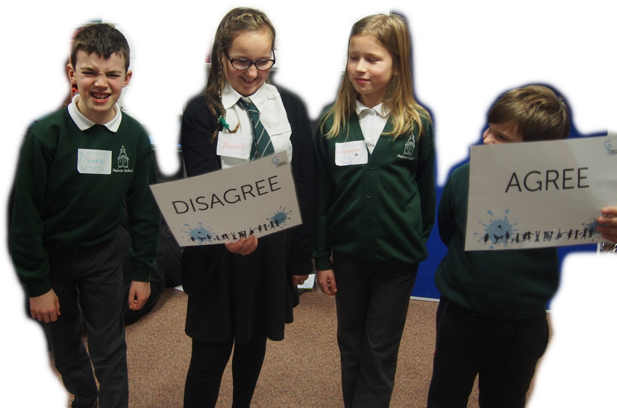As adults prepare to go to the polls on June 8th, we are sharing these blogs about children’s views of life in Scotland.

It’s a busy time of year for those of us who choose to use our vote. If we do, it’s probably because we believe it’s one way to shape the society we live in. Unlike adults, children can’t vote, but they regularly tell us what kind of Scotland they want to live in. Children’s Parliament has reviewed our work to find some consistent themes. Whether adults (the voters, the elected) listen and act on these is in their power.
This first of 3 blogs starts with life at home, the domestic. For people who want to undermine the human rights of the child (or women for that matter) there have always been attempts to protect the home environment as something special, something private, where the intrusive nanny state ought to mind its own business. The wonderful Eleanor Roosevelt challenged that idea with this:
“Where, after all, do universal human rights begin? In small places, close to home – so close and so small that they cannot be seen on any maps of the world. Yet they are the world of the individual person… Unless these rights have meaning there, they have little meaning anywhere.”
Another attack often made on the rights of the child at home is that the UN Convention on the Rights of the Child is anti-family. This is a deliberate misrepresentation, a distortion. In fact, (in the preamble rather than in specific Articles, so perhaps this is often missed) the UNCRC views the family as “the fundamental group in society and the natural environment for the growth and well-being of all its members…particularly children” and recognises that “the child, for the full and harmonious development of his or her personality, should grow up in a family environment, in an atmosphere of happiness, love and understanding”. Implementing the rights of the child means paying attention to family life.
“the child, for the full and harmonious development of his or her personality, should grow up in a family environment, in an atmosphere of happiness, love and understanding”
For children home life is pretty much what matters most. When, at Children’s Parliament, we talk to children about being healthy, happy and safe at home they identify all the small acts of care and kindness that mean so much – a cuddle, time spent, being read to. A child’s love for, and devotion to, their parents is something particularly special. But when the child is met with neglect or violence this is not just adults behaving badly, these acts are infringements of rights.
If we expect families to be a place where children experience their rights, then society – you and me – need to take responsibility for supporting this “fundamental group”. In our work children tell us that families need help, as one child recently put it “in hard and sad times”. They tell us the right help at the right time is often not there. Children also say that some families do not have enough to eat. Not enough to eat – in Scotland – in 2017.
As we use our vote in the upcoming election, we need to pause and reflect about what ideas of democracy and human rights might mean in the home environment, for us and for our families, and for every child in Scotland.
____________________________
Colin Morrison
Co-Director Children’s Parliament
Together has produced information on children’s rights and parenting/family life:
www.togetherscotland.org.uk/about-childrens-rights/childrens-rights-and-parenting